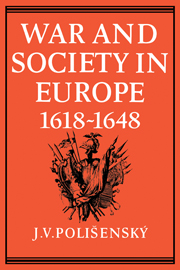Book contents
- Frontmatter
- Contents
- Preface
- Map of Czechoslovakia with list of locations of archives and libraries
- Introduction
- PART ONE PROBLEMS IN THE HISTORY OF THE THIRTY YEARS' WAR
- PART TWO THE EFFECTS OF THE THIRTY YEARS' WAR
- 8 The aftermath of conflict
- 9 Changes in the composition of the Bohemian nobility
- Conclusion
- Notes
- Appendix Tabular survey of archives, libraries and individual collections
- Index
9 - Changes in the composition of the Bohemian nobility
Published online by Cambridge University Press: 05 April 2012
- Frontmatter
- Contents
- Preface
- Map of Czechoslovakia with list of locations of archives and libraries
- Introduction
- PART ONE PROBLEMS IN THE HISTORY OF THE THIRTY YEARS' WAR
- PART TWO THE EFFECTS OF THE THIRTY YEARS' WAR
- 8 The aftermath of conflict
- 9 Changes in the composition of the Bohemian nobility
- Conclusion
- Notes
- Appendix Tabular survey of archives, libraries and individual collections
- Index
Summary
In recent years a good deal of attention has been given the problems of the nobility in early modern Europe: what changes did this dominant element in the ‘Estates’ community' undergo in various parts of Europe in this period of transition from feudalism to capitalism? The larger themes of the period, including the questions of the origin of absolutism, the class structure of society, and the nature of class tensions within society, have recently formed the subjects of two conferences. One, held at Moscow in 1966, was devoted to ‘theoretical and historiographical problems in the rise of capitalism’. The other, at Paris in 1968, considered problems of social stratification. At the Moscow conference A. N. Chistozvonov pointed to the need for further study of social changes in Austria, Prussia and Spain, while at Paris Roland Mousnier found among his colleagues only one who was concerned with these phenomena in central Europe: F. L. Carsten, whose contribution dealt with Brandenburg and Prussia in the sixteenth and seventeenth centuries.
A general treatment of developments in the Habsburg lands has been provided by Victor L. Tapié in his chapter in the fourth volume of the New Cambridge Modern History. Here his authority for Bohemia was Otto Placht, whose conclusions he accepted quite uncritically, in spite of the serious difficulties that are described in the introduction to Placht's volume.
- Type
- Chapter
- Information
- War and Society in Europe 1618–1648 , pp. 202 - 216Publisher: Cambridge University PressPrint publication year: 1978
- 1
- Cited by



